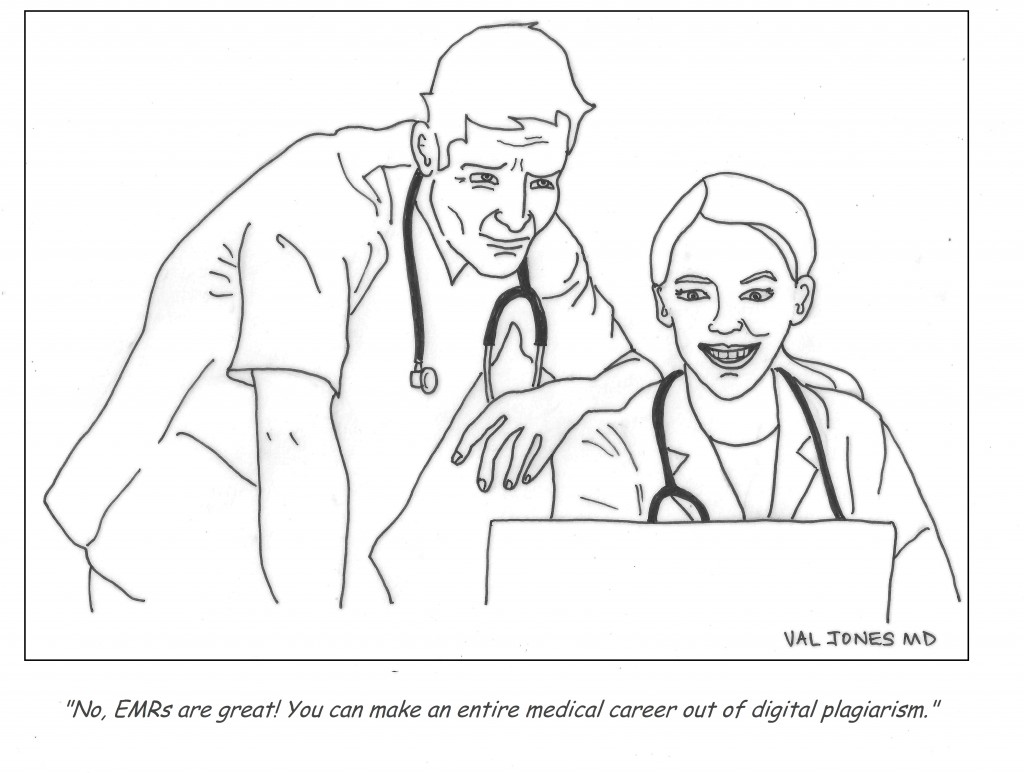Cartoon: Why Some Doctors Love EMRs


Dr. Carl Elliott writes about ghostwriting in the December issue of The Atlantic magazine, “Playing Doctor: How to spin pharmaceutical research.” He profiles a young scientist (“David”) who became a ghostwriter about 10 years ago.
Excerpts:
“Ghostwritten articles surface again and again in litigation (in cases concerning Vioxx, Fen-Phen, Zyprexa, Premarin, Neurontin, and Zoloft, to mention just a few). Years before the Avandia scandal, GlaxoSmithKline paid $2.5 million to the State of New York to settle a lawsuit alleging that it had concealed studies suggesting an increased risk of suicidal behavior in children and teenagers taking Paxil, most notoriously in an article “authored” by Dr. Martin Keller of Brown University. One 2003 study in The British Journal of Psychiatry found that ghostwriters working for a single medical-communications agency had produced more than half of all medical-journal articles published on Zoloft over a three-year period.
To many critics, the moral outrage of ghostwriting is like that of plagiarism: academic physicians are getting credit for articles they didn’t actually write. To David, letting someone else take the credit for his work is a minor humiliation. The real problem, of course, is much worse: spinning data perverts science. It also downplays risks that can lead to serious injuries, and deaths. As David puts it, “The moral crime I was being asked to commit was to do with truthfulness.” Read more »
*This blog post was originally published at Gary Schwitzer's HealthNewsReview Blog*
It’s no secret that doctors are disappointed with the way that the U.S. healthcare system is evolving. Most feel helpless about improving their work conditions or solving technical problems in patient care. Fortunately one young medical student was undeterred by the mountain of disappointment carried by his senior clinician mentors…
I am proud to be a part of the American Resident Project an initiative that promotes the writing of medical students residents and new physicians as they explore ideas for transforming American health care delivery. I recently had the opportunity to interview three of the writing fellows about how to…
Book Review: Is Empathy Learned By Faking It Till It’s Real?

I m often asked to do book reviews on my blog and I rarely agree to them. This is because it takes me a long time to read a book and then if I don t enjoy it I figure the author would rather me remain silent than publish my…
The Spirit Of The Place: Samuel Shem’s New Book May Depress You

When I was in medical school I read Samuel Shem s House Of God as a right of passage. At the time I found it to be a cynical yet eerily accurate portrayal of the underbelly of academic medicine. I gained comfort from its gallows humor and it made me…
Eat To Save Your Life: Another Half-True Diet Book

I am hesitant to review diet books because they are so often a tangled mess of fact and fiction. Teasing out their truth from falsehood is about as exhausting as delousing a long-haired elementary school student. However after being approached by the authors’ PR agency with the promise of a…